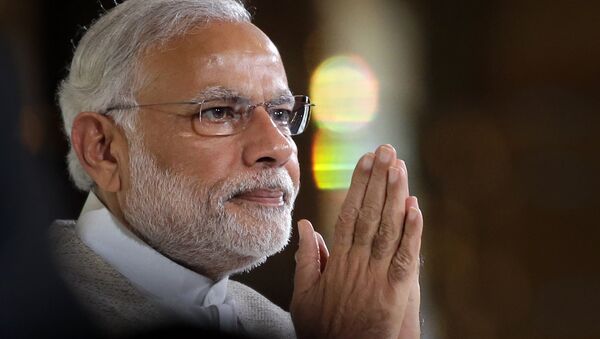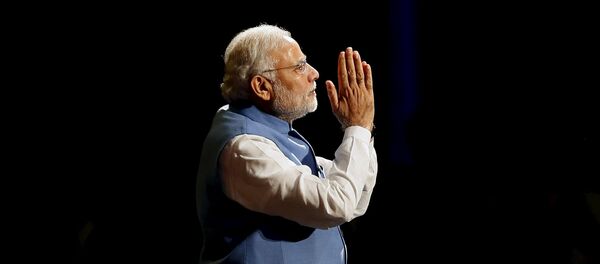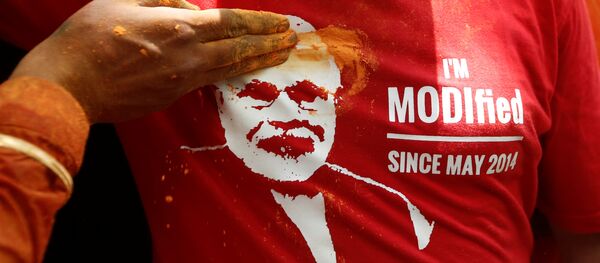New Delhi (Sputnik): India's ruling Bharatiya Janata Party (BJP) surprised almost everybody by securing more parliamentary seats in the 2019 General Election (303) than it had in the previous election in 2014 (282).
A political analyst, Nilanjan Mukhopadhyay, said there were several key factors behind this eventual result which helped to neutralise opposition charges, including administrative corruption, agricultural distress, lack of jobs and displeasure among the country's traders and the business class.
READ MORE: Indian Regional Party Amuses Netizens By Firing Media Team After Election Fiasco
Sputnik: What were the main factors behind the Bharatiya Janata Party's extraordinary and landmark win in the 2019 General Elections?
Nilanjan Mukhopadhyay: I think it is a combination of things, one, of course is the entire narrative of a militarist nationalism infused with Hindutva which Mr Modi built. The second is his personality, to be able to project that the election was all about "him", that besides "him", there was nobody else in the fray, and hence converting a parliamentary election into a presidential kind of election. The third was that they (the BJP) was able to create an impression that this government has done a lot for the poor by highlighting the micro-economic deliveries over the last five years which made a marginal difference to their lives, but did not really alter their lifestyle in total. So they highlighted things like gas cylinders; providing electricity connections, but the basic is that they were able to obfuscate the macro-economic failures of this government as far as jobs and agricultural distress is concerned.
Nilanjan Mukhopadhyay: Two things, one is that the Rafale corruption charges are a very complicated one. The process was not clear or co-opted; offsets were given to Anil Ambani (Indian business tycoon), there was no money trade. The second is the aura of incorruptibility Mr Modi was able to surround himself with. So he had successfully created an image of being a pious, monk-like figure who did not have family, who did not care for his mother; you know, all those things which can go negative within the Hindu culture, were converted into opportunities of strength for him. These are the two basic things.
Sputnik: Before elections, it was felt that several small time traders & retailers remained largely unhappy with Modi government due to the implementation of GST and demonetisation. So what would you say probably changed their minds in a sort of swinging the vote in favour of Modi rather than say the Congress Party or Rahul Gandhi in particular?
Nilanjan Mukhopadhyay: The unhappiness over Modi, over specific issues, which had actually troubled him in the last five years was submerged by the larger picture of national security and the minority; you know restraining the minorities, which Mr Modi was able to create. Let us not forget that this vote was a latent vote of Hindu assertion. Let us not ignore that fact. There was this sense amongst people that whatever else Mr Modi may have done or may not have done, he is credited to have united Hindu votes. I think this was an important factor.
Nilanjan Mukhopadhyay: Yes, the Pulwama attack and Balakot strikes reinforced and gave Mr Modi the opportunity to build his narrative of militarist nationalism. "We went into their (Pakistan's) homes to strike at them", became the phrase. So Mr Modi has been man enough to go inside the enemy's house and destroy them, and anyone asking questions as to how he did it; whether he actually did it or not; was it a false claim, were clubbed as being "handmaidens" of the enemy, which included opposition parties, civil society sections in the media, and of course, the Muslims.
READ MORE: Indian Actress Who Mocked Modi During Election Campaign Gets Trolled
Sputnik: Do you think the average political pundit probably went wrong in their electoral calculations?
Nilanjan Mukhopadhyay: The word political pundit is actually a creation of Mr Modi basically to defame anybody who wants to think differently from them (Modi or BJP). There is no category called ‘political pundit'. The way I look at it is that these are basically political observers; they took people from the media, people from civil society, across the ideological spectrum, nobody expected the scale of Modi's victory. Barring Mr Modi, Amit Shah and the official spokespersons of the BJP, who kept on claiming that they were going to get an overwhelming majority. Nobody else in the country, including a few of their own party members believed that the BJP would get more than 220-230 seats.
The views and opinions expressed by the speaker are his own and do not necessarily reflect those of Sputnik.





